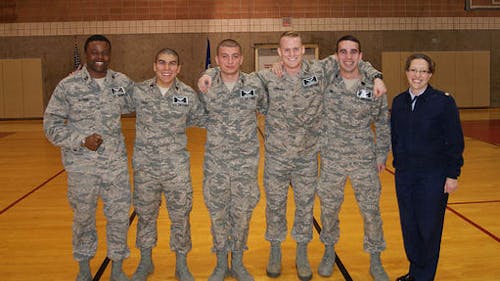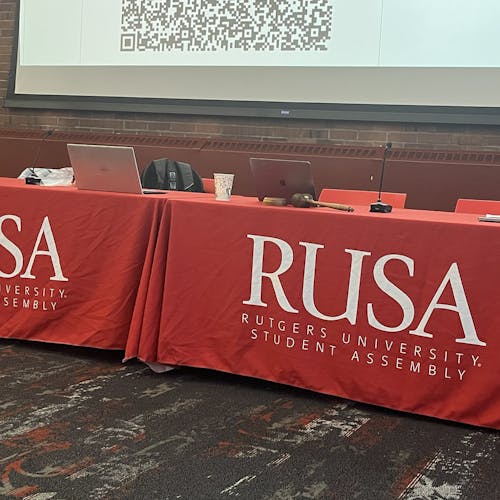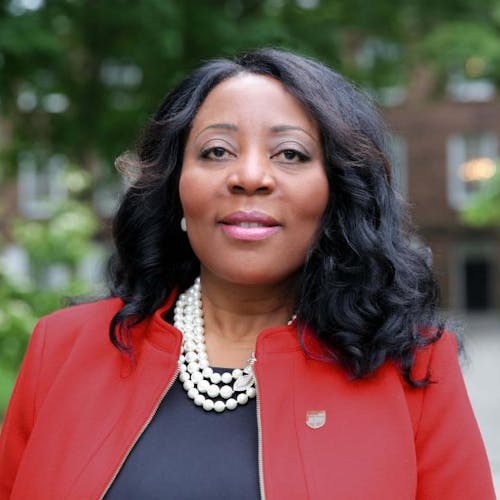5 members of Rutgers ROTC chosen for selective training program

Five students in Rutgers’ Air Force Reserve Officers Training Corps (AFROTC), otherwise known as Detachment 485, were chosen to take part in a selective program to prepare them for a flight career in the Air Force after graduation.
The cadets chosen will attend flight schools upon graduation, where they will hone their skills for the specific jobs assigned to them, which include manually piloting aircrafts, piloting drones and navigating aircrafts.
Peter "Rusty" Carkhuff, a School of Arts and Sciences junior, was selected as a combat systems officer, also known as the navigator position.
“(A combat systems officer) is a combination of three career fields: The navigator, electronic warfare, and weapons systems officer,” he said. “Pretty much what your job is, is to help the pilots, or help the aircraft deliver its mission. So if that’s in an F15 fighter jet, you’re going be the weapons systems officer dropping bombs on bad guys, and that can be the same said for a bomber aircraft as well.”
Carkhuff said that the best point of reference for his assigned position would be the character Goose from the movie "Top Gun."
He said being selected for this program was a monumental moment for him.
“When I was a freshman I looked up to the guys and girls who wore flight suits, who had jobs like these, and it’s just an honor and a humbling experience to be with them,” Carkhuff said.
He said that he joined AFROTC to make a positive difference in his life and to serve his country.
Carkhuff equated ROTC to a four-year tryout for a job in their respective department of the military.
“After you get that job, ROTC doesn’t train you to do that job, it trains you to be an officer, so you have to actually be in the Air Force on active duty to learn the job,” he said.
Da’Zhon Bethea, a School of Arts and Sciences junior, was selected to be a remotely piloted aircraft pilot. He will fly unmanned aerial vehicles, or drones, in the Air Force.
There are two main functions of drones in the Air Force, Bethea said. Certain aircraft are used for reconnaissance or surveillance and will stay in the air for upward of 12 hours at a time. The others are used mainly for things like missile strikes and carrying out operations of that nature.
“(Unmanned aerial vehicles) are pretty much the same size as normal fighter jets, just without the cockpit,” he said. “That leaves room to take out safety equipment, to take out certain things that are specific for pilots, and we could add more things that a capable of longer flight times and sustained air time.”
Bethea said that he joined ROTC because he has always felt that being in the military is the closest he could get to being a superhero.
“When I put on this flight suit it’s pretty much like putting on a cape,” he said. “The rated program that we’ve been associated into is pretty much just a better way of training to teach us how to wear the cape better.”
Brendan Smith, a School of Arts and Sciences junior, was selected to be a pilot for the Air Force.
Smith said that he joined ROTC to represent his family, neighbors and hometown as best he could.
“I’ve always looked up to and wanted to be a pilot for as long as I can remember, so having this opportunity to pursue those dreams and represent the people that I care about means the most to me,” he said.
This program is meant to train young men and women to carry out military operations that require specific skills, Smith said.
“Following graduation, we are going to go to our separate schools, and the air force is going to train us their ways on how to operate,” he said.
Captain Janice Murray, the operations flight commander for Detachment 485, said that there are detailed criteria for being chosen for this program.
“First is desire, if they don’t want to fly planes then it makes it easy to find a different job for them,” Murray said. “But the Air Force flies planes, we are all about air superiority, getting aircraft in the sky and fighting in that dimension, so we need people to operate those aircraft.”
Cadets must master multiple skills before being chosen for the program, such as sustained academic performance, good physical fitness scores and passing the Test of Basic Aviation Skills (TBAS), she said.
“Between the sophomore and the junior year they go away to our officer boot camp, and based on their performance there, based on the TBAS test, which is kind of a flight simulator control test, and they also have to take the Air Force Officer Qualifying Test, that’s an aptitude test, so the results of that, you get a pilot score, a navigator score, some other various different scores and it all comes together in this crazy formula,” Murray said.
Students should care about this because the ROTC program takes regular civilians and students with no military history and no military background and gives them an opportunity to prove that they are worthy of fighting, she said.
“Really, the civilian population of the United States, for them to be able to stay at home and not have to fight, who’s out there fighting? Their neighbor. Their fellow student who sits at the desk next to them, and once they graduate and commission, they’re going to be out there doing the things that other graduates are not doing because other graduates are going to contribute to their country in a different way knowing that (Detachment 485 cadets) and then some all across the country have earned it,” Murray said.
Scarlet Knight pride in the military is unique, and it is the Rutgers community that produces quality students and the Air Force takes it from there, she said.
“In the military, throughout the world when people form our detachment, products of our detachment, products of Rutgers University go out there and start doing great things, you know, they take the scarlet 'R' and around the world, in the cockpit, they’ll fly the Rutgers flag over things, go on deployments downrange to places where they can’t say that they are but they’ll take pictures with other Rutgers grads there,” Murray said. “It’s kind of a neat tradition and neat legacy that throughout the world you bump into someone and you’re like ‘Rutgers! RU!’ and somebody pulls a flag out of nowhere and starts taking pictures and then sends them back to us.”
Stephen Weiss is a School of Arts and Sciences sophomore majoring in philosophy. He is an associate news editor for The Daily Targum.



